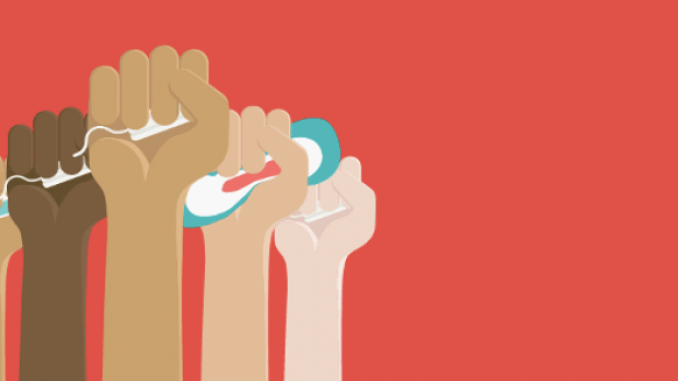
By Jada Simon
Periods have been a rite of passage for women since the beginning of time. Recently there have been several attempts to relieve period stigma, and I’d like to say it’s working.
Typically, when a woman is known to be menstruating, the thought of it is considered disgusting and uncomfortable (mostly to men). With the help of emerging companies and activists, conversations on periods are becoming normalized, and products that allow for smoother menstrual cycles are being invented.
One prime example is August, a company co-founded by Nadya Okamoto that makes biodegradable, highly absorbent menstrual products.
Okamoto believes that by improving the accessibility of period necessities, we can cure its stigma and tackle various related issues at once. Those issues include “pain management, tampon tax, period poverty, lack of period knowledge, uncomfortable period products and sustainable sanitation solutions,” as stated in her recent article published on LinkedIn.
According to pediatrician Dr. Cara Natterson, Okamoto is right. In the New York Times article, “Menstruation Gets a Gen Z Makeover,” Natterson explained that even her 18-year-old daughter educates her on period knowledge she acquired through Instagram and Tiktok videos. “Teens are looking for conversations around people’s experiences, not five-star Amazon reviews,” stated Natterson.
The fight against period stigma is an important one. Women make up 50% of the population, and the majority of women often struggle with practicing appropriate menstrual health. That brings us back to the lack of health products women need to carry out these appropriate practices. Being shamed or met with disgust for something they didn’t choose and something they cannot control doesn’t make that monthly venture any less difficult. In fact, it could potentially cause menstruator trauma and eventually lead to further issues.
It is actually proven that period shaming and trauma not only cause embarrassment but also abnormal changes to a person’s period.
As stated by the period app, Clue, “stress from extreme or traumatic events has been linked to dramatic changes in normal menstruation.” By making a woman feel embarrassed for having her period, she is at risk of real physical harm just because we as a society lack acceptance.
In contrast to the difficulty we have now with getting more of our society to be accepting of periods, some cultures actually see periods as a good thing. In ancient Hindu, Chinese, and Babylonian cultures, having your period was seen as a good omen because it signaled fertility.
Women are instrumental in raising our children. Isn’t it only fair that we help them to feel more comfortable on their journey?
All we can do is try to continue progressing the conversation. That means continuing to have those tough, uncomfortable conversations that we don’t want to have. Gen Z is doing a very good job of that by taking to social media to reveal even the oddest of details in order to bring awareness.
Why not follow the leaders? Yes, that means getting the other half of our population to understand the importance of period management. Men, too, need to step forward and join the cause so that everyone can understand how vital it is to increase everyone’s knowledge of period health.
“The world we’re going to have when these progressive Gen Zers become parents in 20 years — that’s going to be fascinating,” said Okamoto.
In closing, stop the period hate and start improving easy access to menstrual products.
